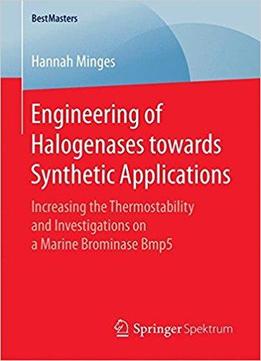
Engineering Of Halogenases Towards Synthetic Applications: Increasing The Thermostability And Investigations
by Hannah Minges /
2017 / English / PDF
4.2 MB Download
Hannah Minges focuses on the investigation of two different FAD-dependent halogenases in order to analyze and improve their applicability for chemoenzymatic approaches in chemistry. Owing to beneficial features, like high selectivity and benign reaction conditions, nature’s toolkit for halogenation provides several advantages, whereas conventional chemical strategies require hazardous reagents and suffer from low selectivity. Therefore, enzymatic halogenation arises as promising alternative in the synthesis of valuable chemicals. One project focuses on the generation of a thermostable variant of the tryptophan halogenase Thal by means of directed evolution. The second project deals with the investigation of the marine halogenase Bmp5. This enzyme is of synthetic interest because it preferably introduces bromine into phenol compounds, whereas chlorination cannot take place.











